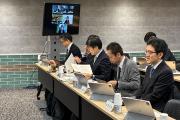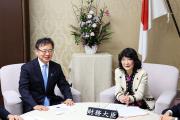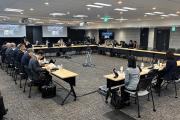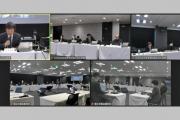At least five drug makers including Santen Pharmaceutical and Astellas Pharma were facing delays in manufacturing work as of January 5 in the aftermath of a massive earthquake on New Year’s Day, Jiho has learned.
On January 5, Jiho asked 10 pharma companies that have plants in quake-hit prefectures (Ishikawa, Toyama, and Fukui) about the impact of the temblor. Aside from Santen and Astellas, Fujifilm Toyama Chemical, Trust Pharmatech, and another company that asked for anonymity told Jiho that they were pushing back the start of manufacturing operations for 2024.
Santen, an ophthalmology specialist, saw the disaster hitting the Noto Plant in Ishikawa Prefecture - which is its main factory that churns out 70-80% of its in-house eye drop products - with damage seen with some buildings and equipment. The plant was offline for the New Year’s holidays and scheduled to go back online from January 5, but the company delayed the resumption to further confirm the damage.
“We will decide on the operational start date based on the results of our investigation,” a spokesperson said, while adding, “There will be no disruptions to the supply as we have several months’ worth of eye drops in stock.”
Astellas was also pushing back its January 5 operational start slated for this year at two sites in Toyama Prefecture - Toyama Technology Center and Takaoka Plant, which respectively manufacture immunosuppressants and antifungal drugs, among other products. As of January 5, there was no clear timeline for the resumption of their operations.
The company said that it plans to look into the impact of the quake and work to restore any damages, while restarting production by considering priorities based on inventory situations. “As of now, there’s been no report of damages that would immediately affect our drug supplies,” an Astellas official told Jiho.
Fujifilm Toyama Chemical’s two factories in Toyama Prefecture were slated to begin this year’s operations from January 4, but their production remained suspended as of January 5. The company was still confirming when the plants could be brought back online.
Trust Pharmatech, a subsidiary of Sawai Group Holdings that took over manufacturing operations from Kobayashi Kako, saw the tremblor causing cracks in some of the buildings at its three Fukui plants. Although this year’s operational start was scheduled for January 4, the company is pushing back the date to sometime after this week due to inspections.
The anonymous company based in Toyama told Jiho that it was to start operations on January 5, but this will be delayed for as long as one week. The earthquake distorted water pipes and caused leakages, while also damaging its automated warehouse storing APIs, it said. Although recovery work started immediately after the disaster, the progress has been slow as repair vendors were off for the New Year’s.
Wholesalers Secure Access to Oku-Noto
In the meantime, pharmaceutical wholesalers appear to have managed to expand their reach to the disaster-hit region. Right after the earthquake, wholesalers were struggling to access the northern part of Ishikawa’s Noto Peninsula, called “Oku-Noto,” the epicenter of the temblor, due to severed roads. By January 4, however, a wholesaler route was established in all two cities and two villages in the Oku-Noto area, though it would take a substantially longer time than usual for distribution, according to industry sources.
On January 5, the Ministry of Health, Labor and Welfare (MHLW) held a disaster taskforce meeting to share the latest on the post-quake situations. As to pharmaceutical supplies, it was reported that distributors affiliated with a wholesaler association in Ishikawa were transporting drugs by land to the affected areas based on requests made by medical institutions. There is a system in place to enable the delivery of medicines the day after the request, though it depends on road conditions, according to the report.
As of January 5, there were no regions where the delivery of requested products was impossible. Requested medicines include not only antibiotics used to treat trauma but also insulin for diabetes and other drugs intended for chronic diseases, according to the MHLW.
JMA Racing to Thwart Disaster-Linked Deaths
Meanwhile, Disaster Medical Assistance Teams (DMATs), made up of hospital doctors from across Japan, among others, are already on the scene to provide medical care. While DMATs support medical services at major hospitals and clinics as well as nursing facilities, Japan Medical Association Teams (JMATs), which consist of member physicians of the Japan Medical Association (JMA), have also been dispatched to the disaster region to primarily provide care at evacuation centers.
According to the Ishikawa Medical Association, JMATs are working to prevent disaster-linked deaths, such as from infectious diseases, at evacuation shelters. There were eight JMATs as of January 8, but the number is expected to be increased to 20 this week, 30 next week, and eventually to 40.
On January 7, a mobile pharmacy sent from the Japan Pharmaceutical Association arrived at Suzu, one of the hardest-hit cities in Oku-Noto, to offer medications in cooperation with DMATs and other relief squads. Such vehicle is set to be dispatched to another district in Oku-Noto as well.











